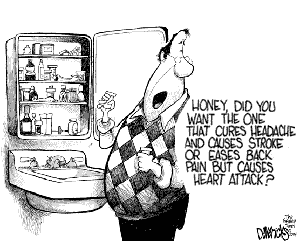Scientific Misconduct Blog Memory Hole: Events of November 5th

3 years ago today: The Lancet accuses Merck of irresponsible deception
On 5 November 2004 the Lancet published an important paper and an excoriating editorial about Vioxx, accusing Merck and the FDA of acting "out of ruthless short-sighted and irresponsible self-interest".From the Lancet - Editorial 5 Nov 2004 (Volume 364, Number 9448)
"Today we publish results from a cumulative meta-analysis which show that the unacceptable cardiovascular risks of Vioxx (rofecoxib) were evident as early as 2000-a full 4 years before the drug was finally withdrawn from the market by its manufacturer, Merck. This discovery points to astonishing failures in Merck's internal systems of post-marketing surveillance, as well as to lethal weaknesses in the US Food and Drug Administration's regulatory oversight. In a recent Editorial, we commended Merck for acting promptly in the face of new findings about the safety of Vioxx. Our praise was premature. The evidence showing that Vioxx caused significant adverse events was apparent well before data from the APPROVe trial triggered Merck's overdue intervention."
"These findings also come in the wake of new disclosures that suggest Merck was indeed fully aware of Vioxx's potential risks by 2000. Investigations by the Wall Street Journal have revealed e-mails that confirm Merck executives' knowledge of their drug's adverse cardiovascular profile-the risk was "clearly there", according to one senior researcher. Merck's marketing literature included a document intended for its sales representatives which discussed how to respond to questions about Vioxx-it was labelled "Dodge Ball Vioxx". "Merck's own understanding of Vioxx's true risk profile and its attempt to gloss over these risks in their public statements at the time"
"The FDA's position is no less comfortable."
"But, too often, the FDA saw and continues to see the pharmaceutical industry as its customer." "Worse still, the FDA's Office of Drug Safety co-exists in the same centre - the Centre for Drug Evaluation and Research (CDER) - as the Office of New Drugs, the part of the agency that works most closely with the industry to license new medicines. Once a licensing approval has been made, it is naturally in CDER's own interest to stand by its original decision."" The inherent precedence that licensing of new drugs takes over safety evaluation is a serious flaw". ". . . the FDA tried to shore up its tarnished reputation by posting on its website an early version of a recently completed observational study into the safety of Vioxx."
"its [FDA's] decision to try to undermine the integrity of [Graham's] work shows, that the agency's senior management is more concerned with external appearance than rigorous science".
"… with Vioxx, Merck and the FDA acted out of ruthless short-sighted and irresponsible self-interest."
"Another important point to come out of this is how little confidence we can have in our medical specialists to act in any independent and critical manner. Virtually every expert rheumatologist, gastroenterologist and cardiologist who should have been ringing the alarm bells is a consultant for the same companies."
In the parallel study published in the November 5, 2004 of the Lancet researchers' pooled data from more than 25,000 patients who participated in 18 clinical trials and 11 observational studies all conducted before 2001. The results showed that patients taking Vioxx had 2.3 times the risk of heart attack as those prescribed placebos or other NSAIDs. This increased risk applied to short trem therapy as well.
In concluding, the researchers stated that "If Merck's statement in their recent press release that 'given the availability of alternative therapies, and the questions raised by the data, we conclude that a voluntary withdrawal is the responsible course to take.' was appropriate in September, 2004, then the same statement could and should have been made several years earlier, when the data summarized here first became available. Instead, Merck continued to market the safety of Rofecoxib. This clearly demonstrated that Merck had, by the end of 2000, sufficient statistically significant information that required the immediate withdrawal of Vioxx".
Earlier|Later|Main Page
1 comment:
Drug settlements always end with the company never having to admit fault. I wish just once, big pharma would take responsibility for there mistakes instead of paying there way out of everything. Im sure that Merck’s $600 million annual defense fee’s for Vioxx probably had something to due with the settlement.
Post a Comment